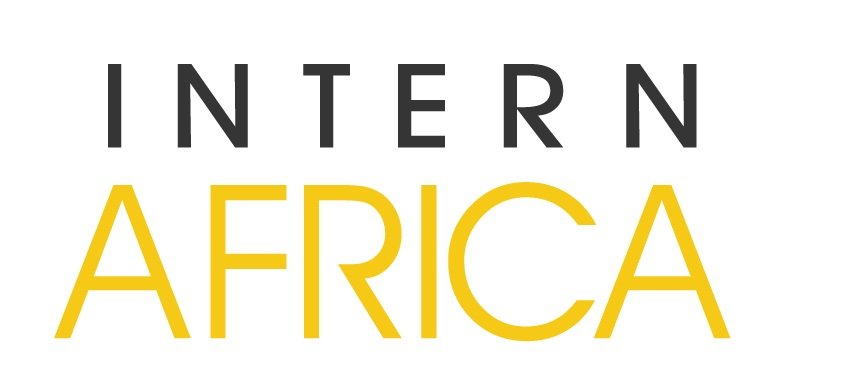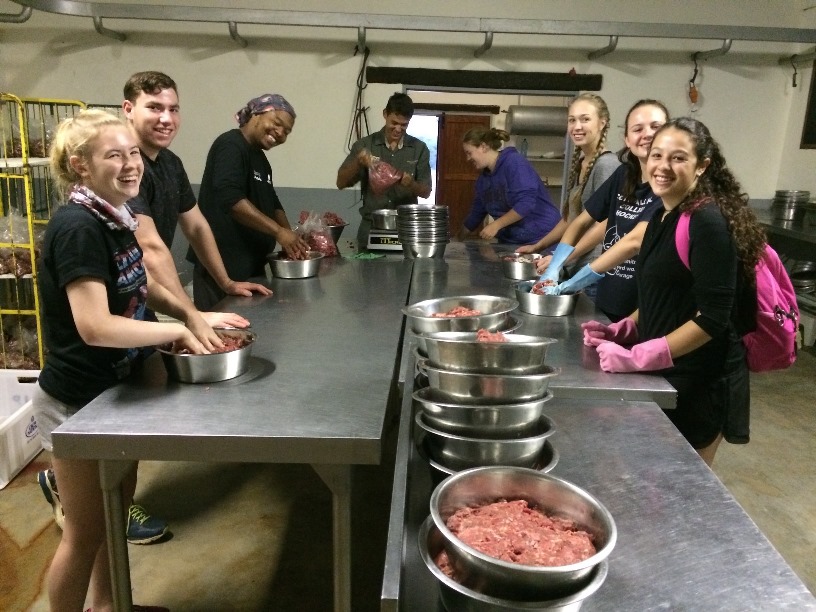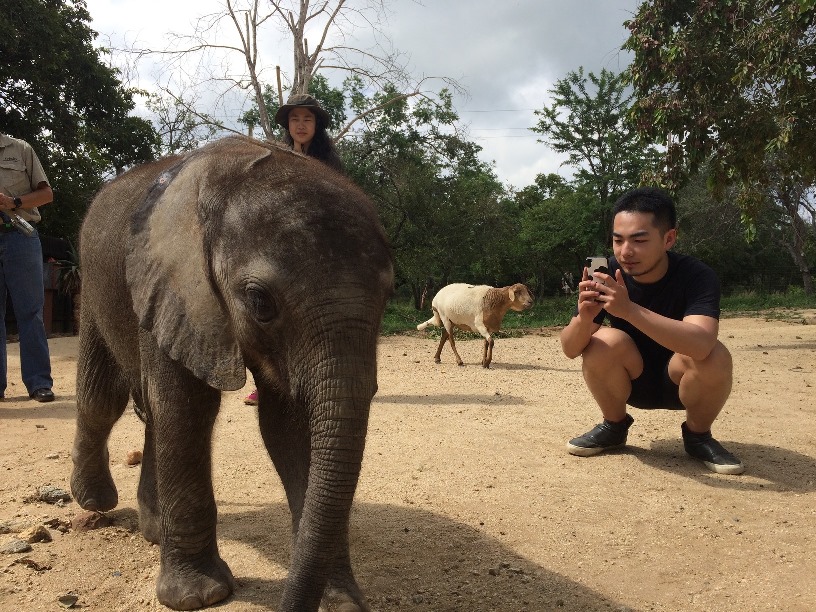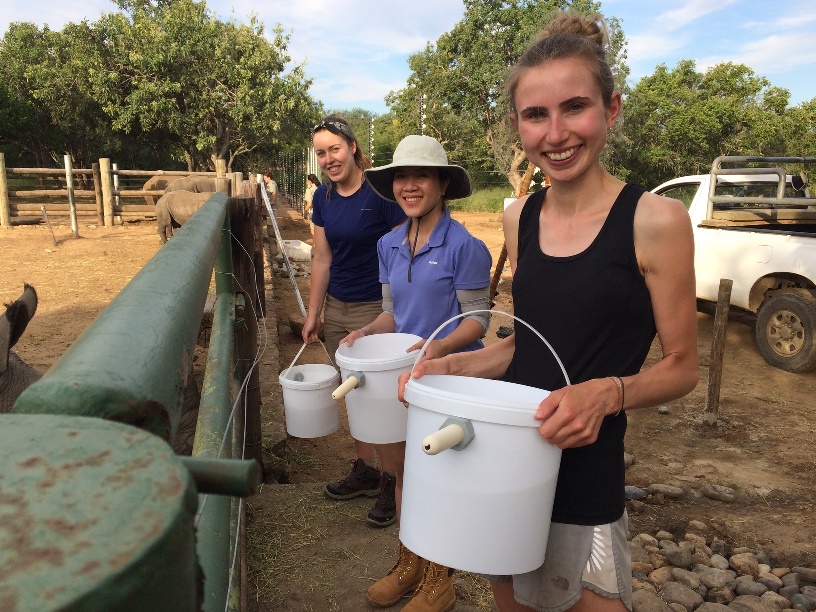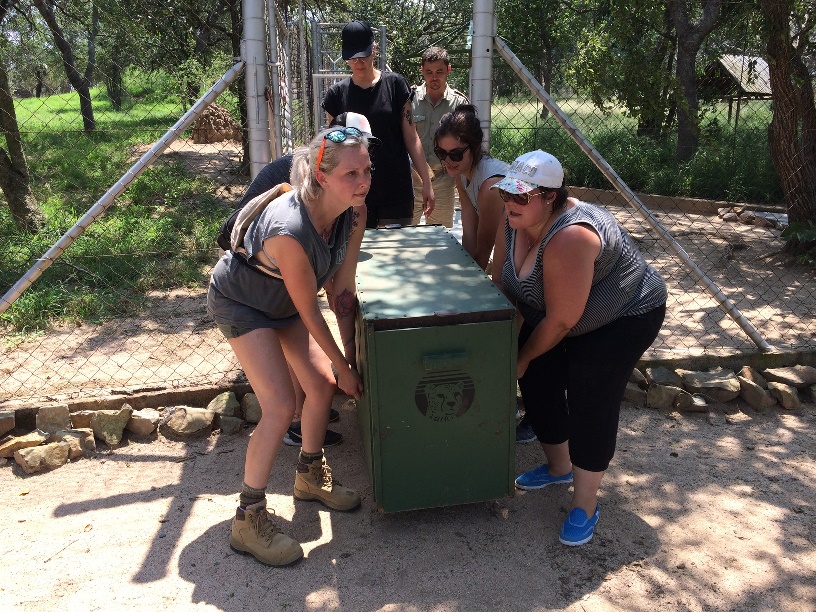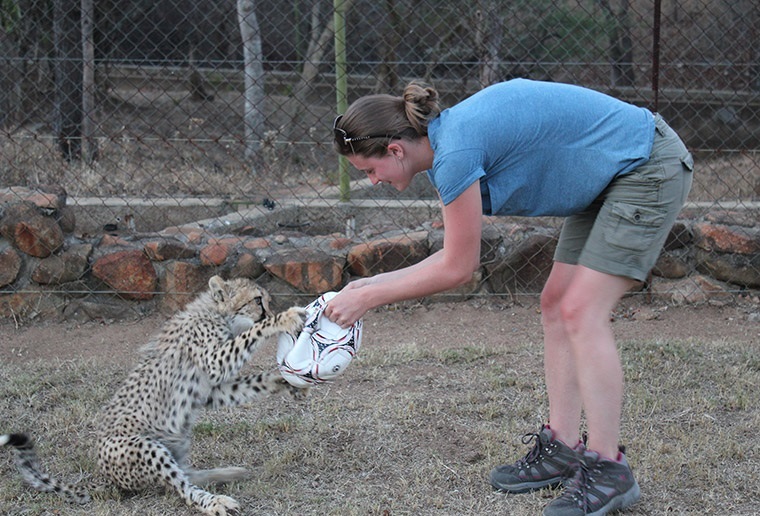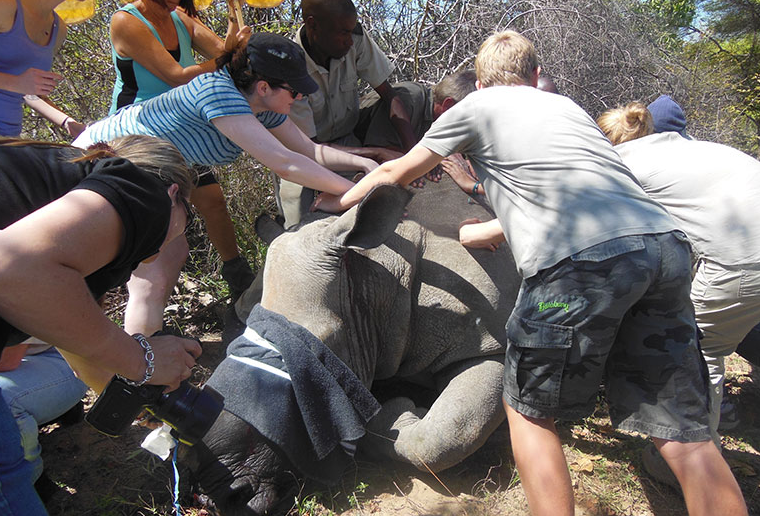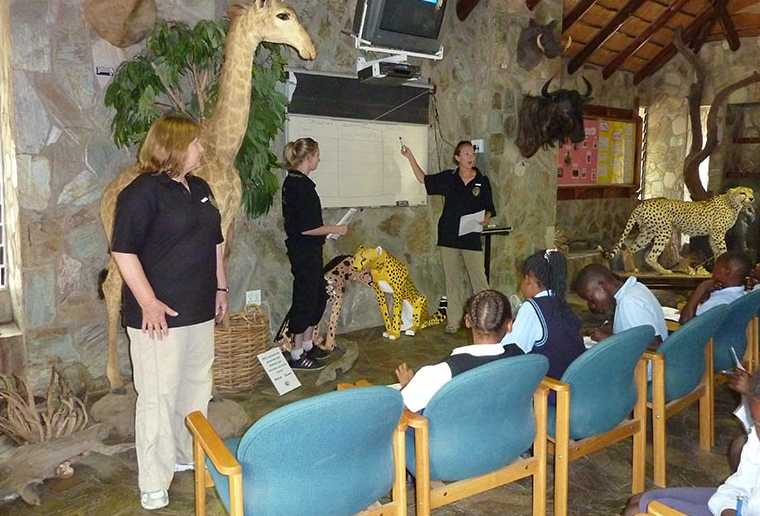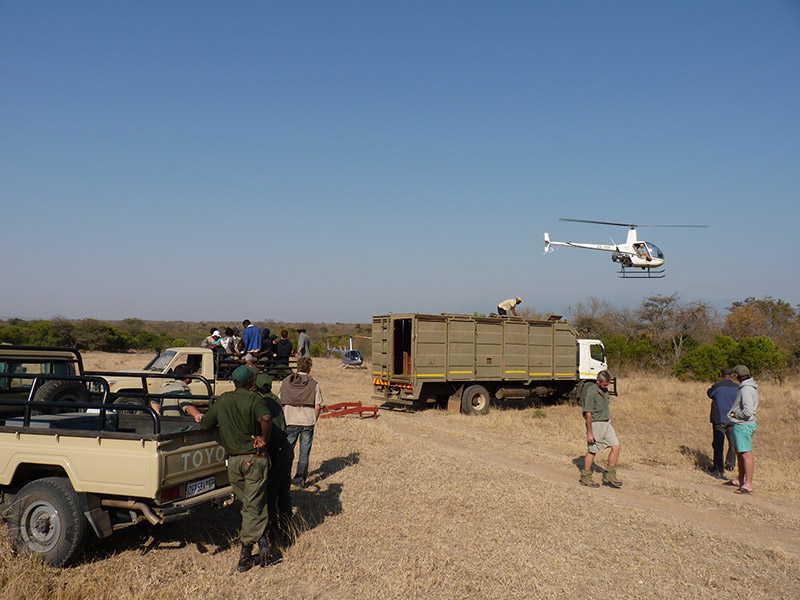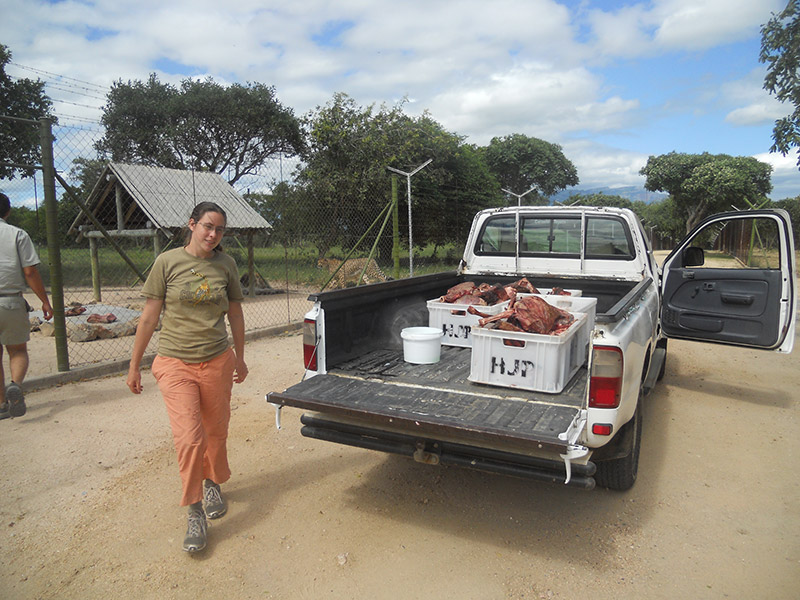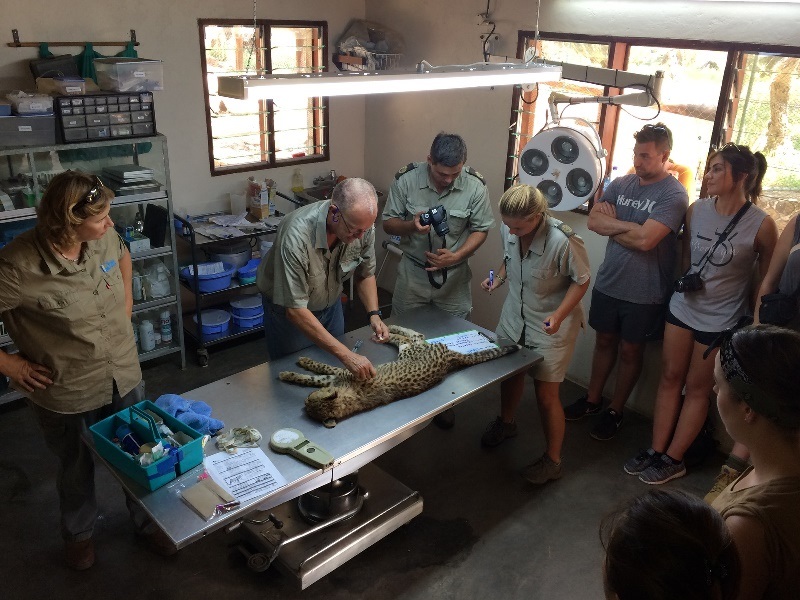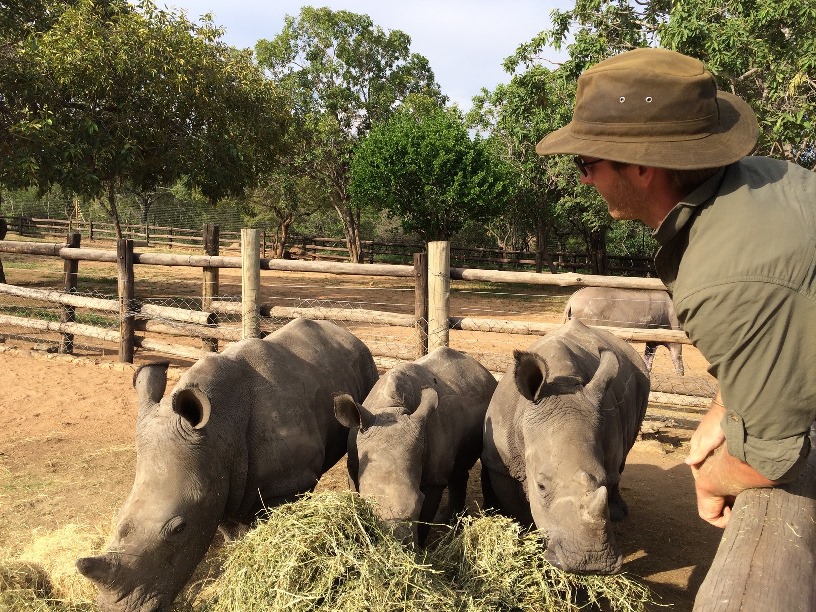The Endangered Species Centre has established itself as one of the leading private research and breeding facilities for endangered species in the country. Governed by a progressive and modern management approach, it concerns itself with the breeding and maintenance of several endangered indigenous wildlife species in southern Africa. The centre places particular emphasis on the breeding and maintenance of cheetah in captivity. The excellent condition of these animals and the premises on which they are maintained, reflect the attention to detail, which is the hallmark of this facility.
The Endangered species centre offers a 21 day program that allows you to gain experience on three different levels. The aim of the program is to equip participants with the aptitude to actively participate in conserving the wildlife of Southern Africa; to build awareness of conservation in a broader global scale; and to experience the beauty and rich diversity of South Africa. The program is divided into three main sections: Participation, Conservation and Sight Seeing.
Participation
You will be involved in the everyday care of the many animal species at the centre. This includes cleaning, feeding and, where required, assisting with or observing any veterinary activities that may occur during their stay. The knowledge gained about the animals and the work of HESC through this kind of participation is both specific and personal. You may also get the opportunity to learn more about the day-today operations at “Rescued Rhinos @ HESC”, a sanctuary for orphaned rhinos and rhinos which have been victim to poaching.
Conservation
This section of the program involves informal lectures on all aspects of conservation and includes specialist input on all animals, grasses, trees and basic biodiversity.
Sight Seeing
The programme enables you to put theory into practise, either through directed observation in the wild or at other centres that specialise in other areas of research or conservation.
You will form part of a hands-on team which mediates the well-being of the animals. They will also have the opportunity to visit places of interest and attractions in the area, including the renowned Kruger National Park.
The Endangered species centre offers a 21 day program that allows you to gain experience on three different levels. The aim of the program is to equip participants with the aptitude to actively participate in conserving the wildlife of Southern Africa; to build awareness of conservation in a broader global scale; and to experience the beauty and rich diversity of South Africa. The program is divided into three main sections: Participation, Conservation and Sight Seeing.
Participation
You will be involved in the everyday care of the many animal species at the centre. This includes cleaning, feeding and, where required, assisting with or observing any veterinary activities that may occur during their stay. The knowledge gained about the animals and the work of HESC through this kind of participation is both specific and personal. You may also get the opportunity to learn more about the day-today operations at “Rescued Rhinos @ HESC”, a sanctuary for orphaned rhinos and rhinos which have been victim to poaching.
Conservation
This section of the program involves informal lectures on all aspects of conservation and includes specialist input on all animals, grasses, trees and basic biodiversity.
Sight Seeing
The programme enables you to put theory into practise, either through directed observation in the wild or at other centres that specialise in other areas of research or conservation.
You will form part of a hands-on team which mediates the well-being of the animals. They will also have the opportunity to visit places of interest and attractions in the area, including the renowned Kruger National Park.
- Age: min. 18
- Location: Hoedspruit area
- Requirements: 18 years, good physical fitness, flexible
- Group size: max 12 participants
- Project duration: 21 days - *7 or 14 day stay is also possible)
- Laundry:Volunteers can hand wash clothes (washing powder is provided)
- WIFI: R20 per hour - only available in the student camp
- Linen/towels: All provided
L
R
Three meals per day are prepared by participants in the camp – a valuable team building experience in itself. There is a kitchen with a fridge in the camp, as well as barbeque facilities. The closest town is Hoedspruit, which is approximately 25 km from the reserve. Regular town trips can be organized for supplies, banking or internet facilities. Telephone facilities are available (at participants own expense).
Basic laundry facilities for hand-washing are available in the camp.
Sundays are spent at leisure. Adventurous activities are available in the area, such as hot air ballooning, paint-ball, river rafting in the Blyde river canyon, horse riding, and elephant back safaris. Should you decide to participate in such activities they can be arranged with the project leader at participant’s own expense. .
T
Hands-on experience
During your stay at the centre you may see and be involved in some of the following:
You will form part of the “hands--‐on” team which mediates the well--‐being of all animals at the centre. You will also have the opportunity to visit numerous places of interest and attractions in the area, including the renowned Kruger National Park.
E
Week 1
Week 2
Week 3
L
PLEASE NOTE: Due to school holidays it may not be possible to visit a school or for the school to visit us. This section will be replaced by other community type work and/or awareness work for HESC in the local area.
Week 1
Location
These HESC is located near HoedspruitR
Requirements
- Be eager to learn and to participate in HESC’s conservation work
- Have a desire to make a difference while gaining invaluable experience and knowledge
- Be prepared to work hard and be a team player
- Be willing to get dirty and work hands-on with the animals in their habitat
- Have a true love of wildlife and genuine concern for conservation
- Be prepared to have some fun
- Please note: although there is no age limit, this is a fairly intense physical experience and a degree of fitness is required
Accommodation & meals
Accommodation consists of 6 twin thatched huts (max 2 people per hut/ 12 participants in total) in Nungu Camp, situated within the boundaries of the Big 5 Kapama Private Game Reserve. Separate facilities are available for male and female participants. Accommodation is simple, clean and comfortable, and each hut is fitted with adequate power points. Linen and towels are provided!Three meals per day are prepared by participants in the camp – a valuable team building experience in itself. There is a kitchen with a fridge in the camp, as well as barbeque facilities. The closest town is Hoedspruit, which is approximately 25 km from the reserve. Regular town trips can be organized for supplies, banking or internet facilities. Telephone facilities are available (at participants own expense).
Basic laundry facilities for hand-washing are available in the camp.
Sundays are spent at leisure. Adventurous activities are available in the area, such as hot air ballooning, paint-ball, river rafting in the Blyde river canyon, horse riding, and elephant back safaris. Should you decide to participate in such activities they can be arranged with the project leader at participant’s own expense. .
T
Tasks
Hands-on experience
- Working with the cheetah, wild dog, white rhino and many other animal species (including both those born at HESC and those rescued)
- Preparation of food and feeding of the animals
- Possibility of working with the wildlife vet (including darting and capturing, for the purpose of operating, blood sampling or translocation of animals, as well as assisting with post-mortems)
- Possibility of assisting in the hand-rearing of animals
- Local community involvement (e.g. visiting schools in rural areas) – Refer to community work section further on
During your stay at the centre you may see and be involved in some of the following:
- Darting of wildlife and possible translocation.
- Tranquilization of a cheetah for health examinations and possible sampling of blood and other issues to check for various disease statuses.
- Tuberculosis testing in wildlife.
- Lectures of darting equipment, drugs and their safety (subject to the current activities at the centre at time of travel)
- Procedures requiring an external veterinary specialist.
- Hand rearing (previously an elephant, white rhinos, zebra and many tiny creatures have been hand reared in the past).
- Wildlife casualties.
- Post-¬‐mortems (subject to the current activities at the centre at time of travel)
- Collection of samples for genetics, blood parasite studies and ticks (subject to the current activities at the centre at time of travel)
- Work with exotic species such as frogs, snakes, birds and any cases that do happen to come into the centre.
- Work together with the curators and the animals.
You will form part of the “hands--‐on” team which mediates the well--‐being of all animals at the centre. You will also have the opportunity to visit numerous places of interest and attractions in the area, including the renowned Kruger National Park.
E
External activities
Please note: Due to weather conditions, urgent volunteer work needed at HESC, public holidays etc. the external activities may be shifted to other days, or weeks within the 3-week program. Due to external factors it is also possible that an activity needs to be cancelled, in which case it will be replaced with another activity at the discression of the student coordinator.Week 1
- Guided tour at Hoedspruit Endangered Species Centre (HESC)
- Morning game drive in open vehicle on Kapama Private Reserve.
- Boat trip on Blyde River dam (Blyde River Canyon)
Week 2
- Pro-Track Anti-Poaching Unit: Learning about training as an anti-poaching ranger, skills in the bush, tracking people, finding snares etc.
- Working dogs & anti-poaching: We visit a K9 training facility where we learn how dogs are used in security, tracking, detection and apprehension work as well as getting an insight into the training methods for dogs and dog handlers.
- Kruger National Park: A full day game drive in Kruger National Park
Week 3
- Kinyonga Reptile Park: Half-day orientation course on snakes and other reptiles
- Cultural village: Learn about the traditions, way of living, culture and beliefs of the local tribe and enjoy a traditional lunch where we have time to interact with the locals
- Night game drive in an open vehicle on Kapama Private Reserve
L
Lectures and practical assessments
PLEASE NOTE: Due to school holidays it may not be possible to visit a school or for the school to visit us. This section will be replaced by other community type work and/or awareness work for HESC in the local area.
Week 1
- South Africa: History, cultures, climate, geography, biomes etc.
- How do I identify this?: The easiest ways to start identifying the magnitude of different trees, insects, birds, tracks and other signs.
- Cheetah: Cheetah status, breeding in captivity, release into the wild, special needs, basic genetics and other interesting facts.
- Nature conservation: What is conservation, wildlife management, management of natural habitat, symbiosis between man and nature, future.
- Anti-Poaching: Global impact of poaching/illegal trade in wildlife, facts and figures, the different angles of anti-poaching, how/where to get involved.
- Bush skills: Orientation, finding water and food, medicinal/practical use of flora.
- Rifle handling: Safety measures and handling skills.
- Mammals and birds: Students give feedback on their assignments during our drive in Kruger National Park
- Reptiles: Full orientation course on snakes and other reptiles with a theoretical and practical component
- *The cheetah and other endangered animals: A lecture prepared by the students for kids from local school.
- *Preparing an event: Students prepare a program (including lunch) for the visit of local school at the Hoedspruit Endangered Species Centre.
- Assessment: Students provide feedback (assignments) on trees, tracks & signs, insects and birds during a walk/drive.
Dates
The program runs for 21 days, please have a look at the below overview for possible start dates: (You can also choose to stay 1 or 2 weeks – do note that not all activities are included then)
12/09/2017 - 02/10/2017
10/10/2017 - 30/10/2017
07/11/2017 - 27/11/2017
01/12/2017 - 21/12/2017
2018
02/01/2018 - 22/01/2018
30/01/2018 - 19/02/2018
27/02/2018 - 19/03/2018
27/03/2018 - 16/04/2018
24/04/2018 - 14/05/2018
22/05/2018 - 11/06/2018
19/06/2018 - 09/07/2018
17/07/2018 - 06/08/2018
14/08/2018 - 03/09/2018
11/09/2018 - 01/10/2018
09/10/2018 - 29/10/2018
06/11/2018 - 26/11/2016
30/11/2018 - 20/12/2018
Rates
Rates includes
The program runs for 21 days, please have a look at the below overview for possible start dates: (You can also choose to stay 1 or 2 weeks – do note that not all activities are included then)
12/09/2017 - 02/10/2017
10/10/2017 - 30/10/2017
07/11/2017 - 27/11/2017
01/12/2017 - 21/12/2017
2018
02/01/2018 - 22/01/2018
30/01/2018 - 19/02/2018
27/02/2018 - 19/03/2018
27/03/2018 - 16/04/2018
24/04/2018 - 14/05/2018
22/05/2018 - 11/06/2018
19/06/2018 - 09/07/2018
17/07/2018 - 06/08/2018
14/08/2018 - 03/09/2018
11/09/2018 - 01/10/2018
09/10/2018 - 29/10/2018
06/11/2018 - 26/11/2016
30/11/2018 - 20/12/2018
Rates
| Duration | 2017 Fee | 2018 Fee |
|---|---|---|
| 3 weeks | 31200 ZAR | 32700 ZAR |
- Pre-departure information/advice on flights, visa, vaccinations, travel insurance by Intern Africa
- Overnight stay at Moafrika backpackers hostel in Johannesburg, should you fly to Johannesburg instead of Hoedspruit
- Transfers between Hoedspruit’s Eastgate Airport and the centre
- Accommodation (shared)
- Daily meals with Nungu camp
- Specified activities
- Weekly town trips
- Welcome Brief: A warm welcome and full brief from the team
- Orientation/Information rules
- Intern Africa will assist you in finding a suitable flight, apply for a possible visa, provide information on travel insurance, immunizations, travel to Hoedspruit and other required details.
- Flights/transfers to Hoedspruit
- Visa fees (if required)
- Travel Insurance
